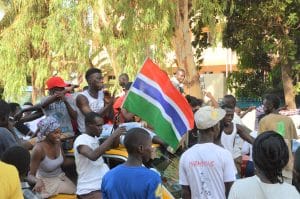Headlines
The History of Gambia: From Medieval Times to Independence

The Gambia, a small West African country, has a rich history that dates back to the 9th and 10th centuries when French traders first visited the region. The region was dominated by the Trans-Saharan trade and was ruled by the Mali Empire in medieval times. In the 16th century, the Songhai Empire took over the region. The first Europeans to visit the Gambia River were the Portuguese in 1447, who attempted to settle on the river banks, but no settlement of significant size was established. Descendants of the Portuguese settlers remained until the 18th century.
See Population, Official Language And More…

Gambia
In the late 16th century, English merchants attempted to begin a trade with the Gambia, reporting that it was “a river of secret trade and riches concealed by the Portuguese”. The French also attempted to settle in the Gambia in the early 17th century but failed. Further English expeditions from 1618 to 1621 were attempted but resulted in huge losses. Merchants of the Commonwealth of England sent expeditions to the Gambia in 1651, but their ships were captured by Prince Rupert the following year. In 1651, Couronian colonization of the Gambia had also begun, with forts and outposts being erected on several islands. The Courlanders remained dominant until 1659 when their possessions were handed over to the Dutch West India Company. In 1660, the Courlanders resumed possession but were expelled by the newly formed Royal Adventurers in Africa Company next year. In 1667, the rights of Royal Adventurers to the Gambia were sublet to Gambia Adventurers but later reverted to new Royal African Company. The beginning of a century-and-a-half-long struggle between English and French for supremacy over Gambia and Senegal started in 1677. The English possessions were captured several times by French, but in Treaty of Utrecht in 1713, British rights to region were recognized by French.
In mid-18th century, Royal African Company began having serious financial problems and in 1750 parliament divested company of its rights in region. In 1766, Crown gained possession of territory, and it formed part of Senegambia colony. In 1783, Senegambia ceased existing as British colony. Following cessation of Senegambia, colony was abandoned. Only Europeans were traders who existed in few settlements on river banks such as Pisania.
The Gambia received its own executive and legislative councils in 1901 and gradually progressed toward self-government. Also in 1901, Gambia Company, first colonial military unit of Gambia was founded. The country achieved independence on February 18, 1965, as a constitutional monarchy within Commonwealth. Five years later on April 24, 1970, The Gambia became a Republic within Commonwealth with Sir Dawda Kairaba Jawara as first Prime Minister and head of state.





